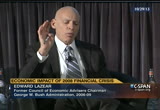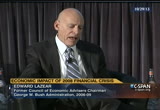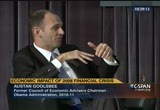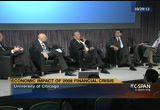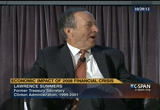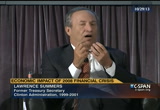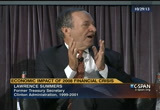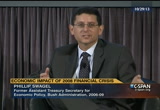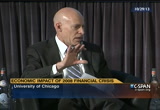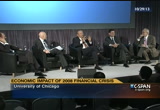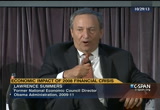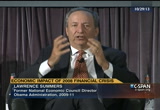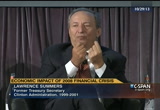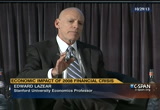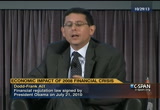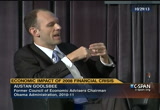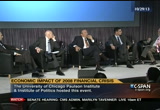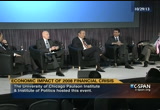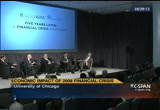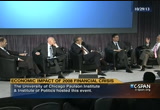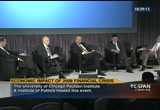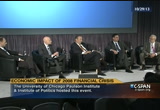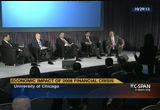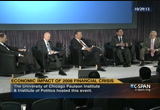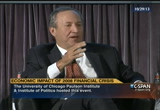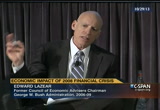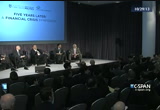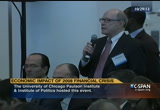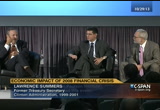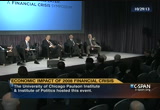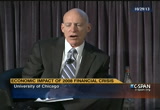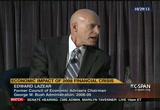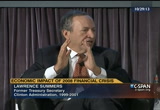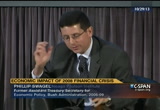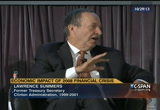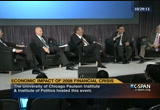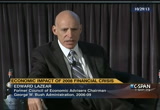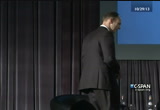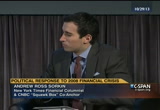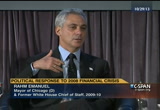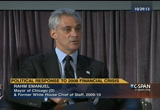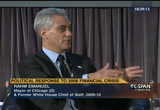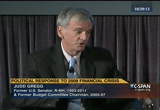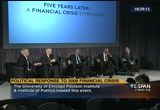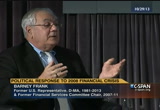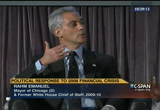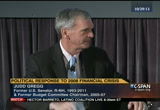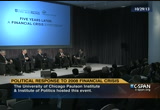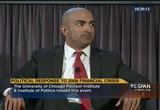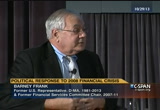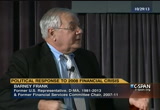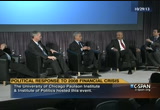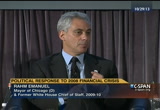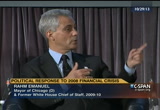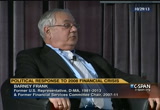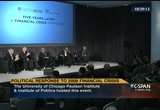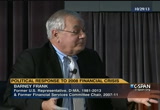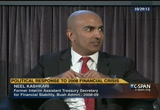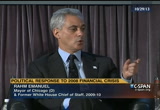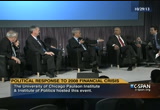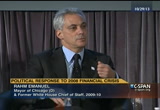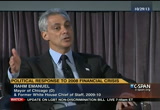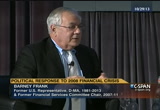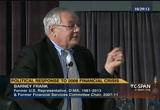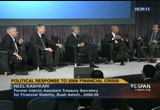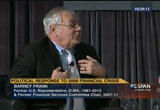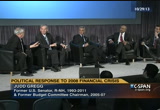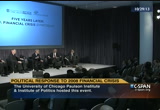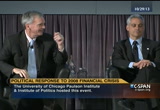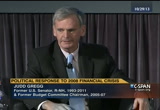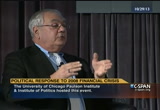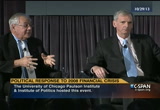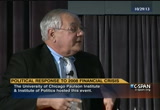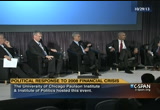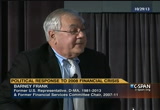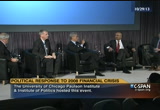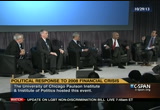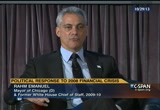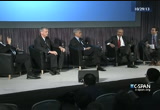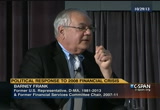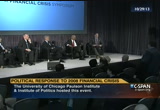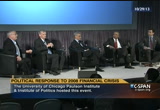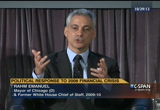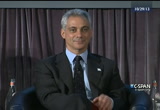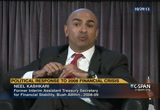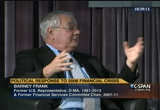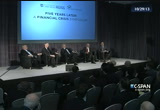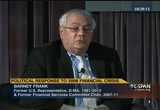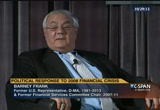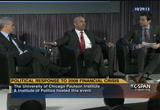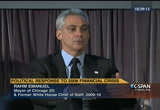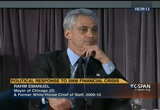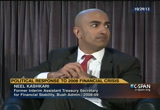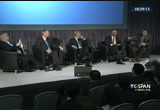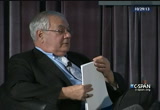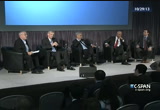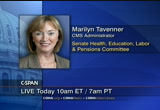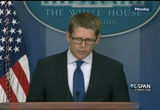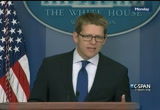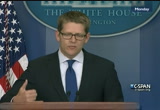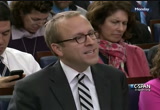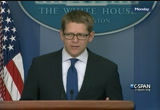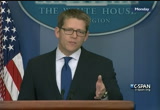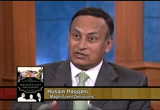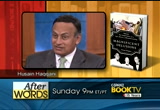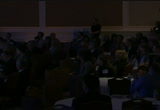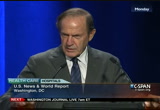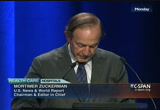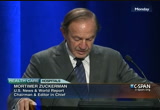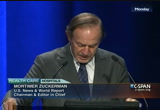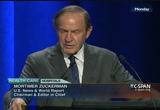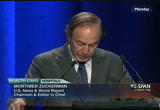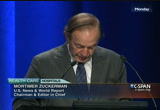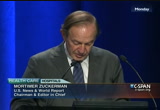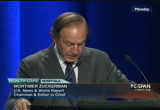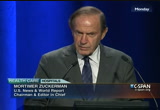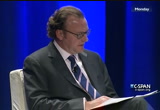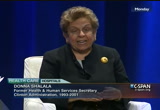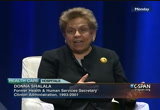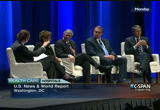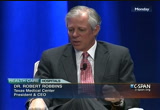tv Key Capitol Hill Hearings CSPAN November 5, 2013 4:00am-6:01am EST
5:00 am
we were the two point people for the democrats. i didn't act in a sense of partisanship. two, the president in his first speech to congress said he would ask for more money if it was necessary. we had a big debate in the white house -- we may have needed more money. the market needed to hear that he was willing to go went get more money. the pre-crisis need for that. he came to the aid of the fed. bankers are not the financial system.
5:01 am
he was willing to spend political capital on the thing that was very unpopular and ask for additional resources. his firstat in address to the united states house of representatives. brought up as it relates to compensation and bonuses was the first issue when we were first debating. i think you have the cause and effect backwards. over the money being given to the banks was enormous. a large number of people were losing their homes. intervening to help people foreclosed upon was a much more conference -- controversial issue than people thought. it is moral hazard if i stop paying my mortgage. you are giving help to people --
5:02 am
why should i account time? defendedama having this policy of giving. we knew what was loans. the we couldn't be sure if it would be repaid. giving money to people who had been part of the problem. was probably a political necessity on his part. it was an effort to drain off some of the anger. we have two periods here. before and after the aig bonuses. that is one all of the anger unleashed. whatever political demonization happened, whether
5:03 am
it was necessary or not, my question is this. when tarp was originally conceived, you thought the banks would use the money for how long? they gave it back very quickly. clearly, that was not part of the plan. our entire goal was to prevent the economy from collapsing. we wanted to put enough capital into the financial market and let it sit there. the rules ended up being changed for political reasons. the pitchforks came out and they paid us very quickly. you have to let the medicine work its way through the system. a lot of us were very concerned when the banks started paying back tarp as quickly as they did. >> the notion that these poor banks, that we hurt their -- these very rich, very well protected people --
5:04 am
get over it. i was appalled by their hypersensitivity. what i was told was that two of the things we thought were necessary to alleviate public anger were one of the things that drove them. restrictions. and they wanted their damn airports. the restrictions on being able to fly around was a problem. we would voted for this -- who this -- frankly, we were getting attacked too. i also believe that this is not stimulated by the politicians. this is genuine public anger. >> keep in mind one thing.
5:05 am
the house republican leadership stepped up. john boehner, eric cantor, paul ryan -- >> they replaced their negotiator because they wanted to be participants. they still had a majority voting against it. >> i understand. let's give some credit where credit is due. house leadership really cares, they do better than a minority of their own party. >> i have reservations about that characterization. a lot of people went to the floor on that monday and voted no because they thought the leadership had the votes. that was true on both sides, i think.
5:06 am
nobody ever casts political votes on your side. -- it iss one politicians and about politics. it lyricalsked question, we are two months before no election. this is a free shot. -- it wasatic party not unpopular after the fact -- a majoritypular -- of our party voted for something with an incumbent president of the other party that would actually help solve a problem and the majority of the republican congress voted against it even with their own
5:07 am
president. that is a very political question . >> i am stunned you are not a more forgiving person. [laughter] >> im on a more forgiving basis. basis. on a one-on-one [laughter] you had your own view of your house colleagues when you know full well they were not leading their members to a yes vote to defend the economy. you had your own views then. you realized they were not holding up their side of the bargain. even though roy blunt wanted to. >> i have deniable plausibility on the issue. [laughter] i know the story, but maybe you can retell it. you are in the room. it is close to midnight.
5:08 am
you might be there too. i think barney might be there. >> i would like the deniability now. [laughter] >> this was that the crux. this whole thing was either going or not going. and this man, mr. paulson, was throwing up because he was so anxious. >> well, he was concerned. anteroom. the the last issue was restitution. the secretary and i had made a -- the secretary had made a proposal, he was in charge. , we couldn't reach an agreement and we were throwing up our hands. it was just the three of us in our room. you went to deceive the speaker. see the speaker.
5:09 am
we knew we had to have the deal that night because the asian markets were opening the next day. 10n the speaker came out minutes later and said we are going your way. i don't think he has ever gotten credit for that. i don't know what happened. she had not done that, there would have been no deal. >> let me go back -- this is a fundamental difference. the difference between the two parties has been a movement in the republican party from the mainstream conservatism to a group that does not accept the notion that the public sector must play a significant role. know that there must
5:10 am
be a public and private sector, at their best. >> that may be allowed function of their party. >> it is a part of the party that has intimidated the rest of the party in the house. i agree with that. it is the perception of many house republicans. you just saw that happen. >> you also saw the speaker take it to the floor with quack -- -- >> after a great deal of crisis. a gun was to his head. >> i do want to get us too much of a candidate -- tangent. >> i think you have a serious problem going forward to the extent that a group of republicans in the house do not accept the legitimacy of the government.
5:11 am
as far as nancy pelosi is incerned -- and 2008, january, george bush came to us and said we need an economic stimulus because the economy is in trouble. pelosi agreed to it and said that we need a stimulus. the republicans won't support spending. it will have to be tax cuts. it will be the most progressive tax cuts we have had. there was a fundamental difference between the two parties today, given the influence of the tea party, on the sense of how much do you sacrifice of your own views to keep the government going. within the republican party in the house today, there has been a scary -- >> at the risk of not making my flight, you are absolving the president's role in brokering
5:12 am
those bridges -- building those bridges. >> george bush and i are not pals. nt paulson and bernanke up to tell us things were collapsing, -- >> i have two more questions. i'm going to start with barney. >> he can borrow some of my time. >> you are very generous. >> jpmorgan is in the midst of , in $13 billion settlement part related to assets it required -- acquired during the financial crisis. i am curious if your view has changed since we last talked. details that have emerged. whether you think that the government should be fining the
5:13 am
company for whatever since happened to those assets during the crisis? >> my view has not changed. i would say this. to my recollection, the washington mutual and bear stearns were not the same. there was much more voluntary activity on the part of jpmorgan chase and washington mutual. bank of america was pushed into taking merrill lynch. i differentiate. washington mutual was totally them. i think it would be not just unfair, but bad public policy to find them for having acquiesced to serious pressure from the federal financial people to take
5:14 am
over bear stearns. that sometime,t someplace in the future there will be a request i other federal financial officials to a bank. to the extent that you can say people are being -- as far as fining them because of what bear stearns did, i think that is a mistake. >> what do you think of that, mr. mayor? --the next time the krantz transfer secretary called the bank and a crisis, do they hang up on them? >> i don't know what they would do. jpmorgan a place that had to get bear stearns. we would've had the lehman
5:15 am
beart earlier. now that we areorgan -- now holding them legally responsible for what we asked them to do at that time. as far as that piece of the basically -- you are -- the government is being given a position to look back and rewrite the rules of what actually, contextually happened. they didn't come forward with the idea of buying bear stearns and absorbing it. we brought it to them. and now we are saying that they're legally culpable. >> final question. if each of you could have individually done one thing different during the crisis, either before, after, during, i don't care, what would it have been?
5:16 am
>> i have thought about this a lot. the communications was the hardest thing we struggled with. we had one microphone, but two different audiences. we wanted to project confidence to the markets, but let congress know how terrified we were. we ended up with a muddled message. i don't have a good answer for how to solve it. better communication with congress to know how terrified we were. they be that would have been easier on the political process. >> i haven't really thought about it. , i don't know if this would've worked, but maybe forcing the republicans to put somebody in the room with us so they would have had more ownership of the final product. it may have changed the context of the vote.
5:17 am
would'veon't think it been popular had we changed the context of the vote. i have to be honest. dohink for what i with us to , carryingo do republican senate water, it was a team effort. i don't think it ever saw period would people work so conscientiously together on both sides. i thought it was one of the most impressively positive point in american history. >> we were locked in a room for a long time. we got a friendship out of it. >> it is not systemic.
5:18 am
not talking about 1920. we are talking about 5 years ago. the problems are political. one of the things people don't understand are the limitations of being in the legislature. you cannot lead from the legislature. but give you a football analogy. the best blocker in the world who protects his quarterback is not going to get the attention of the guy who leads the league in sacks. there is an incentive to be on the attack. supportive, the executive gets the attack. i regret not having fought harder for more mortgage relief in the beginning. ofo believe the lack mortgage relief became an economic drag on the economy.
5:19 am
you have two choices at some point when you are in the legislative branch. you can't say yes and only s. -- yes. i couldn't pull the trigger on saying no. that is my answer. barney used a sports metaphor. it is a historic moment. [laughter] >> we are going to open it up to the audience. same rules apply. lei stand, state your name, the question should end with a question mark. >> i am a fourth-year at the university of chicago. not all are experts in economics. does that have on
5:20 am
any sort of discussion concerning the economy as a whole and how much that hinders effective policy? >> i want to take that. i don't think most people in congress knew this was coming. senate,y caucus in the it was just that we were doing business. people just suddenly woke up and this was on top of them. some of us who were involved had been talking a little bit about it. no one saw it coming. >> you couldn't alert people it -- to answerthout the question directly. the way congress usually works is there is deference to experts. there are a small number of experts on any issue. there, you figure out
5:21 am
who are the people whose judgment you trust, whose values are generally your values in terms of goals. and then you follow them on the issues where they are experts. that is also the case economically as well. generally what happens. >> the house is set up to be -- the senate is generalist. to echo what barney just said, there are a few people you will turn to for their judgment. there were not a lot of people even outside congress that had
5:22 am
experience with a major financial meltdown. our most recent experience was the savings and loan industry. not mutual funds and the entire financial system and insurance companies. we didn't have it in the country. it didn't exist. we were making it up as we were going by the seat of our pants. for all that, we did pretty well. >> chief economist at the northern trust. tarp wereeditions of relatively short on specifics, memory serves. it was a relatively brief document. i have a question. this lack of detail. -- pivotalreasons
5:23 am
moments was that tarp had been intended to purchase bad assets out of the banks and then it pivoted to being a bank recapitalization tool. at what point was that decision made ? >> the original bill was three pages. that was never intended to be a full bill. it was sent to the congress. here are the authorities we need. now let's go crafted bill. the interpretation of that in the press was that this was the full bill. it was never the full bill. congress moved in lightning speed. in those two weeks, markets cratered from beneath our legs. intending toere buy the assets.
5:24 am
as the markets collapsed, we had to move much, much faster. to our credit and to congress's credit, we designed the authority to be enough to make this kind of decisions without having to go back. >> there was consensus there. when it was presented as buying there was the raising of a capital infusion. let's give the secretary the authority to do whichever. that did go out of the deliberations in the room. we also so the was a necessity to do something about compensation. --re was general agreement the compensation thing became a little controversial. the notion of going from buying the assets to capital fusion
5:25 am
grew out of a conversation and there was general agreement. criticism, that i recall, when he decided. the decision was made after the bill had been passed. when it shifted gears from a three-page document to a long document was when a decision was made to markup the senate bill. that was made thursday morning. it was a big mistake, but that was the way folks wanted to go forward. we spend most of thursday trying to clean up the senate bill. recall thatng i was fory paulson asked a lot of money and total flexibility. [laughter] those were the standards we were told to fight for. >> a couple of more questions. in thea second year college majoring in economics and political science.
5:26 am
in the past when there have been historical problems and andtions that have come up are now regarded as fact, how do you reconcile these past competing ideologies into making a plan that is both current and can help resolve the current crisis and that can pass through the government? now'm very troubled right that we are not doing that. i am about to submit a comment to the regulators dealing with residential mortgages very much opposing their major proposal. their favorite proposal is one that would effectively do away with risk retention and home mortgages and allow 100% securitization.
5:27 am
the great majority -- superduper ones that have no risk retention -- the question is i'm surprised so quickly people help her gotten -- forgotten. is noswer is that there true guide against this. the result of political pressure. from the banks and from the low income advocacy groups. that sentiment is recurring. we haven't found a way yet would be my answer. american democracy is very good at fixing problems, but not
5:28 am
good at heading them off. the panel talked a lot about the issues of government involvement in the mortgage industry that are ongoing. how should the government go about trying to address the things that it knows are on the horizon now? having learned what it just to headfrom not failing off this thing. is it possible or are we doomed to keep doing it? >> human civilizations are prone to mass delusion. it is funny, but it is not funny. about a house in california in 2005. i didn't see the house and bubble coming. had predictedpan a housing bubble, the members of my panel would have been outraged that their members were being kept from participating in the american dream. first time homeowners would've been outraged. unfortunately, we have to do our best, but human history is full
5:29 am
of financial crises because, as a society, we are prone to delusion. it will probably happen again. think -- take two events. in 1983, there was three months left. it took them a three-month window to force a decision that ronald reagan and tip o'neill -- judd said something with this true one level. i don't think our congress, with regardless of who got blamed, with more time, would have been more thoughtful. we needed that crisis moment. take a look at the infrastructure, basic research, or immigration. are in our economic
5:30 am
self-interest immediately and long-term. crystallizeoment to and force an action. that is how the political system works. -- i joked aget little bit but i'm serious -- you are not going to get leadership from the legislative branch. leadership comes out of the executive branch. it provides a roadmap, a direction, it sets goals. moving people toward the barn door. that is how this works. creating that moment is what leadership in the executive branch and create. to come up with solutions a little ahead of the schedule. >> one sentence in defense of democracy. i don't see non-democracy doing all that much better. i wouldn't blame democracy.
5:31 am
i would blend the lack of human foresight and the complexity. question, we will see. >> you made the point about needing to invoke confidence in and terror inets congress. if that lack of messaging part of the problem today in terms of gridlock and what it is costing our economy today? -- wehink the situation talked about this earlier, the crises we are facing right now are self-inflicted. politicalted by the dysfunction. the situation is fundamentally different today. i also have some optimism. if there were a national crisis or a real crisis, you would see people come together and congress acting in a more rational manner. >> our final question. >> stuart lucas. how do we create the political circumstances to reset redistricting? >> you look at california, you
5:32 am
look at arizona, iowa. you take it out of the legislative body. then what you have to do -- youe it has succeeded -- bring competition back in. you have to take the state legislators out and put it into a court/nonpartisan analysis. that is what i would do. go, i am going to tee this up for you. you -- is this going to the floor? >you can go to the floor anymor. >> i can go to the floor, but i can't talk. so the hell with that. [laughter]
5:33 am
i am submitting it. it is an official comment on a pending regulation. the five agencies that are charged in the statute about risk retention and mortgages. the deadline is tomorrow. legislation, and the first place, we band the bad kind of mortgages for which i was attacked in "the wall street journal." they said i was keeping poor people from buying houses. those loans we said you could not have. i have copies. [laughter] mortgages,at bulk of they were qualified mortgages, for those, you would be able to securitize them, but we asked for risk retention.
5:34 am
risk would have to be retained by the securitize her. that would newly incentivize them not to buy junk. senators were listening to people in the mortgage industry -- we put in an exemption called a qualified residential mortgage. stupidly confusing. those were supposed to be a superduper safe category. to my dismay, the major proposal is to condense the two, to combine them and to have only one set of mortgages. and one you can't make that you can make without risk retention. this is been the single biggest cause of the problem and i'm hoping that they can be dissuaded and have risk retention.
5:35 am
no mortgages were made in america before but 1980 when i came in apparently. -- that came in. [laughter] >> this is been a remarkable treat. thank you so much. thank you. [applause] [captioning performed by national captioning institute] [captions copyright national cable satellite corp. 2013] head of the centers for medicare and medicaid will be on capitol hill to talk about the health care law's implementation. we will have that live at 10:00 a.m. eastern time on c-span. tomorrow, health and human services secretary kathleen sebelius will testify before the senate finance committee.
5:36 am
she has said that problems with the health care website will be fixed by the end of this month. >> abc news reporter jonathan careasked about the health enrollment problems. here is some of that exchange. yes as waser is reported widely at the time. the whole point is that cms is processing paper applications, but it bypasses the need to create an account. creating an account is what led to the bulk of the issues in the early days. theially, on the launch of marketplaces on october 1, you are not able to do that by phone. in response to the trouble that thes were having online,
5:37 am
unacceptable trouble they were having, we balked up the staffing of the call centers and made it possible for individuals to call and enroll and sign up and bypass the creation of an account, so that could be handled by the: centers. these applications are then processed through healthcare.gov. fixre working to healthcare.gov. in terms of the user experience, the whole point was to alleviate the frustration that users were having online. take that frustration away from them and allow a live person in a center to handle questions and sign-ups and enrollment for them. is spoken in tons of dramatic revelation. it was a known fact that the time. we never pretended otherwise. the whole point was to beef up the calling centers.
5:38 am
the american people were looking information, a way to avoid the frustrations they were having online. i want to go back to exactly what the president said. he said you can bypass the website and apply by phone or in-person. it can be done in 25 minutes. these memos say that we are all stuck in the same cube. and they all have to go through the same portal. >> i get it. but the person who calls is not the one who continues to wait after the person is filled. >> the president said you can apply and 25 minutes. that is not true. >> there is a reason to because ago here. us, you get the information, you got questions answered, and they take over from there. you find out what you're eligible for. once your application is processed. the point is to relieve some of
5:39 am
the frustration that americans were understandably experiencing. individual, roughly on average, the interaction you have when you bypass the creation of account so that you did not have to do that online. to enroll, you would give the information you need, that would be processed, and you would find out how much you qualify for and you could be enrolled that way. we have never said that you would not -- that the endpoint of the process would still have to go through healthcare.gov. >> that is not true. look at your own words on october 21. you said you can enroll over the phone, you can enroll in person. said there23rd you are 4 ways to enroll in the exchanges. you said there are four ways to enroll. said there were four
5:40 am
different ways. there is only one way. a all have to go through healthcare.gov. again, -- >> i am trying to understand why the president gave the american public the impression that they -- apply when their paperwork is processed through healthcare.gov, but they don't have to go online to do it is the point, john. while we were fixing the website, making it meet the standard that we set, that americans could have an alternative way with beefed-up staffing and new rules allowing the calling centers to do this to provide this relief that americans needed. i'm not sure what you think you have discovered here. >> you can bypass the website? you just said it all has to go
5:41 am
through the website. which is it? , you have a conversation with someone, you give them your information, they process it for you, you bypass the creation of an account which is where most of the problems were happening for users on the website, eventually that does still have to go through healthcare.gov, but you have done the work. >> one more thing. tell me if this was accurate. kathleen sebelius said that a person on the other end of the phone and get questions answered as well asanguages walk somebody all the way through the process and enroll at the end of the day. >> at the end of the day. you get somebody your information. would you call -- when you call and they process that information, they process it whatever it is you are signing up for. they can do that once you're up
5:42 am
the phone. you don't have to stay on the phone. that is the point. to relieve americans who are frustrated. i think everybody else understands what i'm saying. i am sorry i can't say the same for you. >> white house spokesman jay carney taking questions about health care enrollment problems. pakistan.cerned about i always want pakistan to overcome dysfunction for their sake. i want good relations with the united states. this is not just out of love or caring for the united states, but out of love for pakistan. the have to understand that no --er nation can strip you ndia's size is an
5:43 am
advantage for india. pakistan has nuclear weapons, they have nuclear weapons. pakistan needs to lay with everybody in the neighborhood. it needs to address its dysfunction. to put its 40th percent of on schooled children in school. it needs to make sure that the population does not continue to rise at the face -- pace faster than economic growth. none of those things can be addressed between pakistan and an american military personality. >> the former pakistani ambassador to the united states. sunday night at 9:00 p.m. eastern. on book tv. the most important
5:44 am
issue congress should consider in 2014? that is the question for the student cam video competition. make a 5-7 minute documentary that includes c-span video for your chance to win the grand prize of $5,000. this year we have doubled the number of winners and total prizes. in by januarye 20, 2014. coming up, a conversation on hospitals and the new health care law. senator majority leader bill also a former surgeon. [applause]
5:45 am
>> hello, everybody. theegrets for coming at time i did. i was supposed to be here a little earlier. becauseghted to be here this is such an important part of what "u.s. news & world report" does, which is to provide information of high intellectual content and activities that is almost unavailable in the country. beiously, we hope this will an exciting and provocative forum and we could not have asked for a more impressive and distinguished group of panelists. it is like looking at a who's who of hospitals. when i knew i was going to be late, i can only think of one other comment. said, this is the earliest he will ever be late.
5:46 am
i want to thank people who have taken their time out from busy for many, which include improving and saving lives. we look forward to their thoughts and yours over the next three days. the hospital industry is undergoing momentous change in response to dramatic shifts in patient populations, soaring costs, chaotic and obsolete financial structure -- including a payment structure by the government and increasing demand from government regulators. all of this will be complicated and compounded by the affordable care act which will provide access to care for millions of people who were previously uninsured, not to mention that simultaneously it will demand a lower cost and all of the above will have an immense effect. i have to confess that i spent the entire weekend time to decipher all of the things going on with what is now called obamacare. it was not easy and i am still
5:47 am
not sure then i got more than a couple inches into the problem. i have been writing about it all weekend. i have to say to you i am unbelievably nervous and uneasy about what it will do to the world of health care. this legislation is going to focus on the cost of health care, that i am not sure in which direction. going to be on somebody's agenda as we go forward because of the growing demand for government entitlements on revenues. think of how much welfare and medical services consume. 30% or 40%? it is more than half of the federal budget. health care programs take the biggest chunk. constitutedprograms 14% of all of our domestic spending in 1992. laster, they took 22%. to2022, they are projected
5:48 am
represent 32% of all domestic spending. this is unsustainable. our outcomes are not particularly good. we spend 18% of our entire national income on health care. the rest of the world spends inseparably less than that. most of the comparable countries 1/2 on amuch as 1/3 to per capita basis. the outcomes are not worse, they are better in terms of the statistics i have seen. the longevity of people as they approached 70 and how many years they will have after 70. we have the highest quality medical care, but it is not distributed in a way that will remain acceptable to the american people at this stage in the game. -- the issueasons
5:49 am
is not why or how we got to this point. the fundamental point is that the government has forever underestimated the cost of staying healthy. when lyndon johnson signed medicare into law in 1960 five, it was estimated to cost $12 billion by 1990. the actual price tag was 110 billion. this year it is estimated that $600 billion. i could go through medicare part a and medicare part b. we're going to look at a level of cost that will create a huge backlash in the country. we will have to find ways to reduce the burden on the government and on our people. fromting on payments people with higher incomes are assets and raising the medicare that is population living longer and longer. in a poll that came out today, the elderly are opposed to anything like this and given the
5:50 am
nature of the political system, it is hard for me to see anybody and the national office taking the lead on anything like this. there are many programs that seek to change how doctors and hospitals are paid to keep these costs under control. a theory that there should be a way of rewarding them for quality and efficiency. the pace of change has been slow. analysis,to a recent roughly 11% of health-care spending last year by employer- sponsored plans was based on values as opposed to volume and services preformed. nine dollars out of every $10 is paid into the system with no attention as to whether the care was good or whether it was carried out appropriately. that byment is made
5:51 am
paying a fixed price it ignores results. that 156em is also million people in america are covered through employment-based health care programs. health care benefits that they get are basically nontaxable, in terms of personal taxes or excise taxes, and there is a comfort zone with that. it is going to be difficult to penetrate that. we don't know yet whether there will be again a kind of resolution of this until there is a crisis. some kind of fiscal crisis that may force our public leadership to react. many of you in the world of hospitals or pioneers and value- based care are removing being sentenced for treatment -- the incentives for treatment. there will be a natural resources to the value-based approach.
5:52 am
-- resistance to the value-based approach. popular uprising that will force change and force it in unacceptable ways. the hospital tomorrow will have to adopt some of these ideas and others will copy the leadership of these hospitals, otherwise the prognosis, in my judgment, is graham. -- grim. there will be a major restructuring of how health care is organized, and reimburse. this confirmation is starting to take hold and is recognized by almost everybody. around the country, more and more hospitals are developing these disease management programs for the chronically ill and implementing prevention efforts such as outpatient programs. simultaneously, high-powered computers are gobbling up billions and billions of pieces
5:53 am
of data from health care records and insurance claims, from vital signs to medical images. even more breathtaking, some hospitals are using data to identify those at risk for disease and offering personalized treatment options. one example of this is illustrated by the strides in cancer treatment. the potential here is enormous. things are gaining speed. of patient care and quality are improving. the change may be certain, but the landscape ahead is unpredictable. we should all buckle up for a rocky ride. particularly if this becomes a political football. for reform to be effective, it must be planned, managed, scrutinized, and fine tuned. that is a good part of the reason we're all gathered here today. to learn from each other and about how to adapt to what will
5:54 am
surely be a new reality, while maintaining the same high quality standards that propelled many of your institutions to the top of the best hospital rankings year after year. it'snly thing i can say those of us who are basically amateurs about this and look at it from the perspective of that whatolicy is worries me is that it is so easy to manipulate the politics of our country today. it is almost easier than it has been in decades, in part because of the social media. it now transforms messages, without editing, without the ability to critique them and yet have an enormous impact on the growing audience of younger people, who sooner or later will be in a position to dominate our politics and our public policy. those of us who were in print journalism have had a certain amount of experience with the transformation from print to these new platforms of the
5:55 am
dissemination of knowledge and information. the kind of responsibility we will like to think we have imposed on what we published is not the same on those platforms. you are in a position now where it is going to be a different kind of political atmosphere and it will have a big effect sooner or later, and maybe a negative effect on how we form public holocene. i urge you all as a group -- policy. i urge you all as a group to come forward if this is possible with programs that have a chance of developing widespread public support. we need it on a you need it, and the country needs it. a cue ball very much for your time and attention. thank you all very much for your time and attention. [applause] thank you for allowing me to host this panel. i am going to try to get right to it. the topic at hand is the hospital of tomorrow.
5:56 am
next to somebody who could not be better positioned to give us some thoughts about how things are going with the implementation of the affordable care act. might venture to give a grade to the implementation. -- might that grade b wade be weighed? >> it has been very tough. but if we know how to do anything in this country, we know how to do software. i think this will eventually roll out. look at the states that are doing it themselves. they already have the platforms for medicaid. they are registering hundreds, thousands of people for medicaid. the ones that are running their own exchanges have them up and going for the most part. the problem is that we do not have enough of them who bought into running their own exchanges
5:57 am
or registering people quickly unmedicated. we have enough time that they will get it right. we must have everybody enrolled. there is no way we will be able to continue the kind of cost shifting that has been going on or be able to deliver the kind of efficiency we will talk about unless everybody has insurance and decent insurance. it has to work. the technical problems are just that. their technical problems. i have not heard anybody say they are designed problems, fundamental design problems. we know we have large numbers of uninsured, we know we have to get them insurance. we know some of them need to be subsidized. we neednd of the day, to get this done and i think there was enough time to do it by march 1. i will turn attention away
5:58 am
from the hot topic of the day and get us to the hospital of tomorrow. thing, there was an article about the implementation of the whole affordable care act. the letter david cutler sent to the administration after the law passed. one of the things that letter cited was not enough attention to provide engagement and getting the provider community bought into all of the changes that needed to take place. you lead one of the largest provider organizations in the country and as you think about the transition. a -- period ahead, how do you think about those challenges? how will you manage to get from one side of the river to the other? world tovolume-based the value-based world? on, it's to amplify
5:59 am
about the implementation so far. we do need to be patient. it is early. we will get everyone who needs coverage signed up. we live in this 24-hour a day new cycle. we are all appear without our cell phones and are blackberries. we need instant gratification. they could buy one medicare was introduced. there was no iphone. we all have to be patient but that. we have to talk to each other. is a big question about engaging the providers. theme is thatmmon doctors do what you pay them to do. change ining to be a focusing on delivering the highest quality care at the samet cost while at the
6:00 am
time providing excellent customer service. that is a different paradigm than what we have operated on before. it is going to be an educational process, changing of a culture. it is a great system in that everybody at the cleveland clinic has one-year contracts. think about the large hospitals that have multiple private practitioners, or even inside the university system. even the universities do not take into account quality, oftentimes the promotion of the process. it is going to be a big change and there are going to be some bumps in the road. award peoplee to based on quality outcomes and holding costs. we have never been charged with doing that. we want to do as many big-volume cases that are high-reimbursable cases
95 Views
IN COLLECTIONS
CSPAN Television Archive
Television Archive  Television Archive News Search Service
Television Archive News Search Service  The Chin Grimes TV News Archive
The Chin Grimes TV News Archive 
Uploaded by TV Archive on

 Live Music Archive
Live Music Archive Librivox Free Audio
Librivox Free Audio Metropolitan Museum
Metropolitan Museum Cleveland Museum of Art
Cleveland Museum of Art Internet Arcade
Internet Arcade Console Living Room
Console Living Room Books to Borrow
Books to Borrow Open Library
Open Library TV News
TV News Understanding 9/11
Understanding 9/11